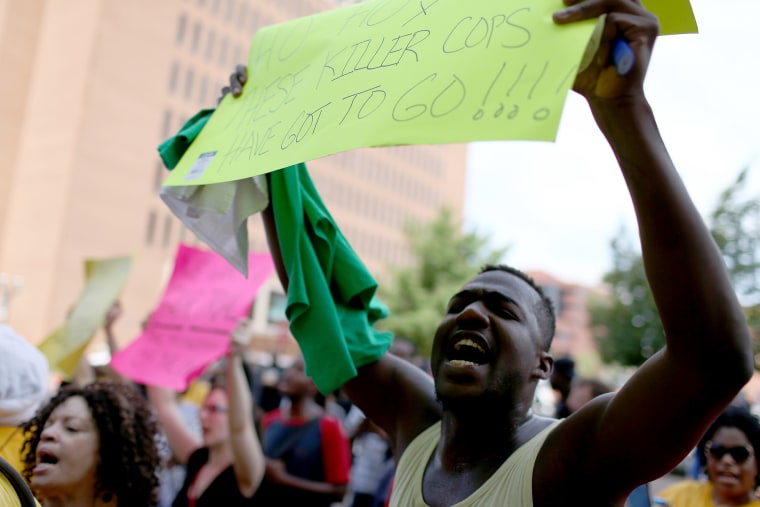As tensions in Ferguson, Missouri appear to be easing, a new poll shows that Americans across the country are divided along racial lines on the justification of the fatal police shooting of unarmed black teen Michael Brown.
More than half — 57% — of black Americans said the killing of the 18-year-old Brown by Ferguson Police Officer Darren Wilson on Aug. 9 was "not justified," according to a New York Times/CBS News poll published Thursday. Eighteen percent of white Americans said the shooting was not justified.
Additionally, 31% of white Americans, and 71% of black Americans, said they think police are generally more likely to use deadly force against a person of color, according to the poll.
In Ferguson, the football team at Normandy High School, where Brown was a student, will honor the teen's memory by observing a moment of silence before its first home game of the season on Saturday. Also this weekend, Brown's family is scheduled to attend a march on Saturday led by Rev. Al Sharpton on Staten Island, N.Y., in memory of Eric Garner, who died on July 17 after police placed him in a chokehold.
Brown’s funeral will be held Monday in Ferguson, and Sharpton will deliver the eulogy. Additionally, Ferguson-Florissant School Board President Rob Chabot said he expects that classes will begin Monday, after the start of school was delayed by the unrest gripping the community.
Related: Michael Brown's bright future, cut short
After days of confrontations between protesters and police, Thursday marked the third consecutive night of relative peace on the streets of Ferguson. Seven people were arrested, down from the 47 who were detained on Tuesday. Amid signs of a possible return to normalcy, Gov. Jay Nixon ordered the Missouri National Guard to begin withdrawing from the St. Louis suburb, where troops had been in place since earlier this week. The National Guard was set to begin moving out of Ferguson on Friday.
Attorney General Eric Holder on Wednesday visited Ferguson on Wednesday, a night of relative calm in the community. Capt. Ron Johnson, of the Missouri State Highway Patrol, called the night a "turning point." President Obama "felt the attorney general had a good and worthwhile trip," White House spokesman Eric Schultz said Friday from Martha's Vineyard, where the president is on vacation. Schultz wouldn't comment on whether Obama will visit Ferguson, saying, "I don't have any scheduling announcements."
The focus of the community now appears to be turning to the investigations in the case. Earlier this week a grand jury began to hear evidence on the shooting. The make-up of the 12-member jury includes three African-Americans (two female, one male) and nine white people. The County Clerk's office says that blacks make up 18-20% of the St. Louis County population.
Protesters have also called on county prosecutor Bob McCulloch to recuse himself. Missouri state Sen. Jamilah Nasheed delivered a petition Thursday with 70,000 signatures calling for McCulloch to step aside.
McCulloch, who is white, is distrusted by much of St. Louis County's black community. They cite his extensive family ties to the police force, and his failure to bring charges in several high-profile cases in which white police officers have shot black citizens. And they were angered when McCulloch waded into the debate about policing operations last week in Ferguson. McCulloch criticized Nixon's decision to put Johnson in charge, calling the move an insult to county police.
The attorney has said he will stay on the case, and the governor has given the prosecutor his backing. Criticism isn't helpful to the tasks that must be completed by authorities, Nixon said.
Protesters have also called on Ferguson Mayor James Knowles and Ferguson Police Chief Thomas Jackson to resign immediately amid "their failure of leadership in a time of crisis."
The American Civil Liberties Union of Missouri posted online late Thursday what it described as a report from the Ferguson Police Department on the fatal shooting of Brown. The ACLU had filed a lawsuit seeking documents related to the shooting. The report was short on details, showing little more than the time and location of the shooting. The document was apparently turned in on Aug. 19, more than a week after the killing of Brown occurred. It was approved on Aug. 20, the document showed.
Another eyewitness, Michael Brady, came forward on Thursday to share his account of the altercation between Brown and Wilson.
Brady, who has appeared to provide contradictory information during different interviews with the media, told msnbc's Lawrence O'Donnell that he was in his bedroom on Aug. 9 when he heard an "altercation" outside. In contrast to several other witness accounts, Brady said he didn't see Brown raise his hands in surrender at the time of the shooting.
Trymaine Lee, Zachary Roth, Amanda Sakuma and Alex Seitz-Wald contributed reporting from Ferguson.
